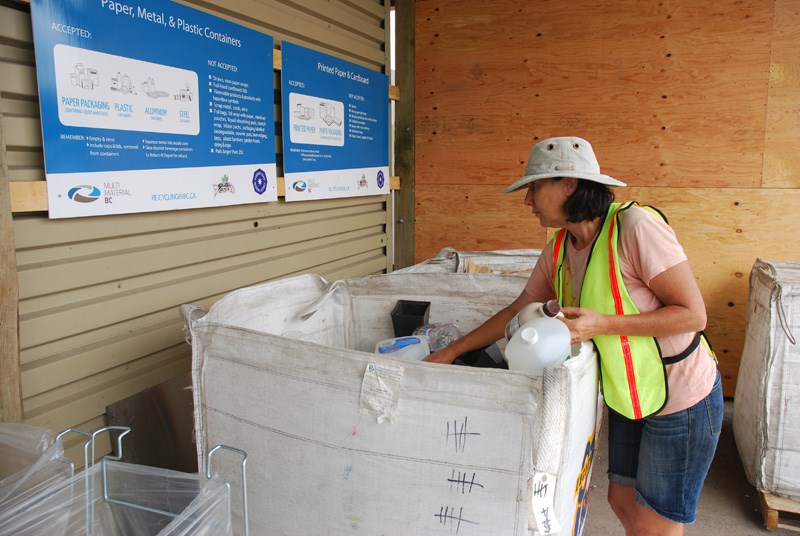The Multi-Material BC (MMBC) recycling program finally arrived on the Sunshine Coast last week with the opening of an MMBC depot at Salish Soils in Sechelt.
While the existing depot operators in Gibsons and Pender Harbour have yet to sign a contract with the Sunshine Coast Regional District (SCRD) to switch over to MMBC, Salish Soils owner Aaron Joe said for him it was time.
“If you keep holding out for the perfect deal, nothing’s going to happen,” Joe said Tuesday. “In order to run our business, we had to make a move.”
After meetings and discussions with the established depots, Joe said he “felt there was a lot of old issues that haven’t been resolved, but those issues are not our issues.”
On MMBC, he said: “It’s the hand we’ve been dealt. You’ve got to make lemons into lemonade.”
The new depot, located at 5800 Black Bear Road, will accept only residential recycling in these categories:
• Printed paper and cardboard (not accepted are books, non-paper gift wrap, padded envelopes, boxes with wax coatings, foil-lined bags, paper towels, napkins and tissues).
• Paper, metal and plastic containers (not accepted are straws, non-paper wraps, foil-lined cardboard lids, flammable products and products with hazardous symbols, scrap metal, cords, wire, foil bags, foil wrap with paper, stand-up pouches, liquid-absorbing pads, stretch wrap, blister packs, packaging labeled biodegradable, ceramic pots, lawn edging, tarps, plastic furniture, garden hoses, string and rope).
• Plastic bags and overwrap (not accepted are crinkly cellophane wrap, zipper-lock bags, potato chip or snack bags, plastic shipping envelopes, multi-layer or laminated plastic packaging and plastic bubble packaging).
• Glass bottles and jars (not accepted are drinking glasses, dishes, cookware, window glass or mirrors and ceramic products).
• White and coloured plastic foam packaging (not accepted are packing chips, “peanuts” or “noodles,” and blue or pink foam board insulation).
The long list of not-accepted items has been a major sticking point for Gibsons Recycling Depot owners Buddy Boyd and Barb Hetherington, who argue that the material will end up in the landfill and set back the community’s zero waste goals.
“The elephant in the room is what’s going to the waste stream,” Boyd said.
Boyd has been a vocal critic of MMBC, pointing out that the provincial legislation’s pollution prevention hierarchy allows incineration of non-recyclables and residuals. While MMBC has denied it intends to feed Metro Vancouver’s incinerators, Boyd and other Zero Waste Canada members have questioned how long that commitment will last.
Joe said the Sechelt depot has no plans to set up a separate stream for materials that MMBC won’t accept.
“At this point, no. We’re keeping it simple. But I absolutely agree with a lot of things Buddy is saying. There is nobody in the community, I believe, who believes in recycling more than Bud.”
In fact, Joe said, he asked the SCRD to include in his contract a clause specifying that he will not stay in the program if incineration of residuals becomes a reality.
“If it’s about burning, we’re not in,” he said.
Boyd and the operators of GRIPS in Pender Harbour have publicly stated that they and Joe formed a recycling coalition, agreeing not to sign on for MMBC unless all three were satisfied with the terms.
But, Joe said, at the end of the day he had to make a decision for his business.
“At some point you have to move forward, so we can move forward with other programs, like curbside organics. When we hold back and don’t go forward, everything else gets stalled.”
He said he felt the SCRD came up with a fair deal for him.
“The other thing — the reason I liked it is it’s only a two-year contract, so if it doesn’t work out, that’s OK.”
For Salish Soils, he said, the MMBC recycling depot is another facet of the community hub he’s trying to develop.
“People can come here, buy their organics, pick up a bag of soil and do their recycling. We’re creating a climate where people can feel good about what they’re doing, including our employees.”
As for working in tandem with the two established depots, Joe said he hopes the SCRD can facilitate bringing all the players together.
“The way I look at this is it’s a collaboration, not a coalition. How do we all play in the same sandbox?”
Boyd, meanwhile, said the two established operators “were surprised to see Salish Soils go off on their own and sign a contract, in essence breaking our agreement.”
Hetherington’s work “to decipher the contract and the MMBC conditions was freely shared with both GRIPS and Salish Soils,” he added. “It seems that Salish chose to take our research and information and go their own way, but the recycling depot coalition is still intact, with GRIPS and Gibsons Recycling Depot.”
Both operators were continuing their discussions with the SCRD for a contract, he said.
MMBC was launched province-wide on May 19. The SCRD later opted out of curbside recycling pickup in Roberts Creek and Halfmoon Bay, citing unspecified extra costs to taxpayers and asking MMBC to run the program itself, while negotiations with operators have stalled the transition to the MMBC depot program.



